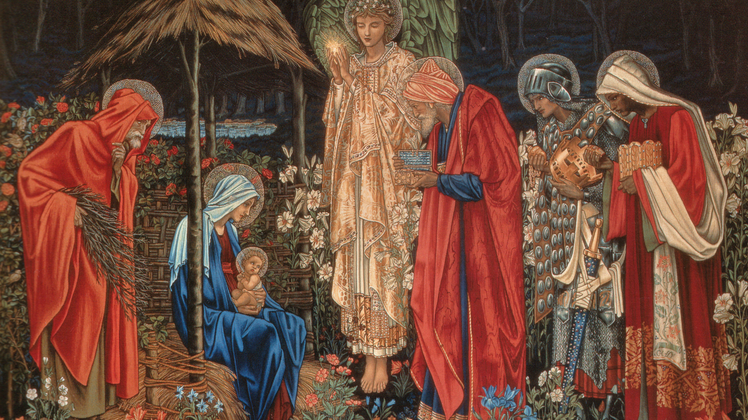Follow the Light and Find Peace
The Epiphany of the Lord

What is it that we celebrate on the Feast of the Epiphany? Are we just commemorating the wise men paying homage to the child Jesus? The word epiphany means “manifestation,” or “making known.” This clues us in that what we celebrate is really bigger than this one event, and reminds us of the meaning behind the whole Christmas season, and indeed, all of time, which is God being made known in the world.
Nine months before Christmas, at the Annunciation, Christ was made known to Mary by the message of an angel. That was an epiphany. At Christmas he was made known to the shepherds of Israel, again by an angel. That was also an epiphany. Today we celebrate the fact that he was made known even to those outside of Israel, this time by a star. But of course Christ’s epiphany does not end there. His divinity was made manifest in particular at his baptism, when the Father’s voice declared, “This is my beloved Son, listen to Him,” and at the Wedding at Cana, when Jesus manifested his divine power by turning water into wine. All three of these events, the Adoration of the Magi, the Baptism of the Lord, and the Miracle at Cana, are epiphanies, which is why they are often depicted together in Christian art.
Epiphany is traditionally a time of blessing. It’s a custom to bless holy water on Epiphany, in connection with the waters of Christ’s baptism and the water he transformed into wine at his first public miracle. There is also an Epiphany tradition of using chalk that has been blessed by a priest to mark the entrances to our homes. We do this praying that, like the wise men, we will follow God’s light and honor Christ in our homes. The special customs of this time of year are all about making Christ known — in our lives, in our families, and in the world — because Christ’s epiphany is ongoing. His final instruction to us before He ascended into heaven was to preach the good news to all the nations.
That Christ’s epiphany is for all peoples is especially highlighted today. The magi who came to pay homage to Christ were not Jewish. This is significant because the Jews, like most people at the time, were very tribal. There was a high degree of mistrust toward anyone who was “other.” In this way they are not so very different from us now, only our tribes have different names: they tend to bear the names of political parties or various ideologies. It is very difficult for us to trust those who are not in our tribe. We even have tribes within our Church, which is most scandalous.
Those who desire true unity in the Church and in the world ought to pay attention to what our gospel presents to us today; very different people, with different traditions, different customs, different backgrounds, Jews and Gentiles, praying together in peace and friendship — the magi and the Holy Family. What unites these very different people is their adoration of Jesus.
If we want peace and unity in our world, in our church, and in our homes, we need to pay attention to this. The only thing that is going to heal the divisions in the Church and bring back those who have gone astray is the Eucharist — the true and reverent worship of Jesus, just as present in the Sacrament as he was in Bethlehem, God made flesh. And the only thing that is going to heal us personally of whatever divisions we may have in our own hearts that cause us anguish, is the same thing; true worship of Christ in the Eucharist, the source and summit of the Christian life. We call the Eucharist communion because it makes us one, and it makes us one because it is the Body of Christ.
So you and I have to do what the magi did. We have to go to Bethlehem — a name that means “House of Bread” — to find the Bread of Life. We have to bring gifts not of frankincense and myrrh, but of humble and contrite hearts. Maybe you’re like the little drummer boy from the song, and you don’t think you have anything good enough to offer Jesus. Well the psalms tell us, “a humble and contrite heart you will not spurn.” So if that’s all you’ve got, he’ll take it and transform it into something glorious, like he did at Cana. He transforms it into peace.
This is Jesus’ gift to us. At his birth, what did the angels announce? Peace on earth to people of good will. God’s gift to us is that we live in peace and harmony, united with one another and with his Son, of whose Body we are members — not necessarily at peace with the world, from which he calls us out, but at peace in our union with the Body of Christ, both the members and the head. To give God the gift of ourselves is to accept God’s gift of peace and unity in the Son and in His Church.
Like the bumper sticker says, “Wise men still seek him.” So let us be wise. Let us seek Christ our King with humble hearts. Let us follow the star. The star that guides us is the light of truth. It can be found in the scriptures and in the teachings of the Church. It can be found in the natural world, made by God to reveal his wonders. It can be found in the liturgy. It can be found in our fellow Christians, who, like St. Paul says in Philippians, shine like the stars of the sky (cf. Phil 2:15). Wherever we find it, the light of truth always points us to Christ, because Christ is Truth incarnate. He is the light of the world. He is the light of all nations. He is the guiding star and the destination, the source and the summit, the beginning and the end, the newborn king and the Ancient of Days. Come, let us adore him.

